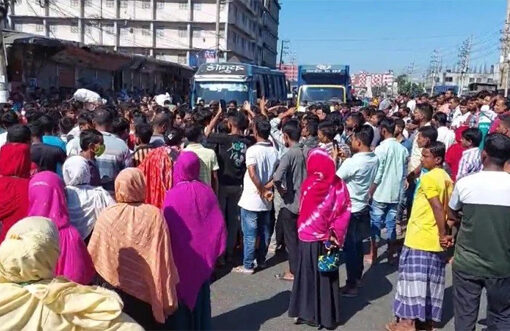RMG Sector : Retailers, brands ask for innovation

International clothing retailers and brands have asked for innovation, improvement of efficiency and use of synthetic raw materials so that they can source garment items for a long term from Bangladesh.
They revealed it while discussing at a panel titled “RMG Roadmap: Towards a Prosperous Future” held at a Made in Bangladesh Week 2022 at International Convention City, Bashundhara in Dhaka.
The weeklong events are being organised by the BGMEA and Bangladesh Apparel Exchange (BAE).
Bangladesh has already achieved a lot in garment trade as the country is the second largest supplier of apparels worldwide after China.
Now the time has come to make the achievement sustainable with innovation and bringing variation in products and quality of goods, said the retailers and brands.
Anne-Laure Descours, chief sourcing officer of Puma, said Bangladesh needs to go for synthetic raw materials production as the country was already strong in cotton fibre-made garment items.
She also said the setting up of green garment factories would continue as the country was the champion of green units worldwide. Descours called for innovation, quality and reskilling of workers for sustainability in the garment sector.
Francisco Javier Losada Montero, chief sustainability officer of Inditex, said Bangladesh was already in a very good position regarding innovation.
Bangladesh needs to improve in online trading and establishing strong collaborations between the retailers and suppliers, he said.
Circularity is going to be a new innovative idea in productivity for the sector to save on water consumption, he said.
Rita Lohani, director for operations of Walmart Sourcing, Bangladesh, suggested bringing diversity in products and improving the efficiency in garment production as those were related to the sustainability.
The next 10 years are important for the country’s garment sector as Bangladesh has already come a long way in the garment trade, she said.
The upskilling of labour is also important for the country for sustainable supply of garments, she added.
Winnie Estrup Petersen, ambassador of Denmark to Bangladesh, said Denmark was providing support through International Labour Organization with regard to health and workplace safety.
Both Bangladesh and Denmark have been building partnerships for more business between the two countries, she added.
Kutubuddin Ahmed, former president of the Bangladesh Garment Manufacturers and Exporters Association (BGMEA), suggested forming a committee involving the BGMEA for solving the ongoing crises such as that involving energy.
Currently, the main problem in the sector is the energy crisis stemming from the Russia-Ukraine war, he said.
He also said transparency and traceability were the “product passport” for the garment business now.
Because a study in 2020 showed that 67% of customers wanted sustainable products and 20% of consumers wanted the brands to be proactive in aspects such as transparency and traceability of products, he said.
Bangladesh has already successfully traversed the first phase in garment business as the country has the highest number of green garment factories and is the second largest exporter after China, he added.
However, now the time has come to take to the second phase by improving workplace safety and utility, water and chemicals use, Ahmed said.





Comment here